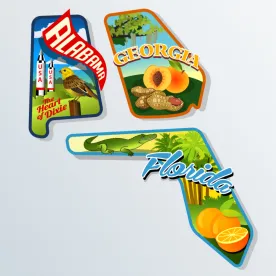The US Court of Appeals for the 11th Circuit held that copyright law does not protect the research references and annotations contained in the official annotated compilation of Georgia statutes. Code Revision Commission v. Public.Resource.Org, Inc., Case No. 17-11589 (11th Cir. Oct. 19, 2018) (Marcus, J).
This case involves the Georgia state legislature’s asserted copyright in the Official Code of Georgia Annotated (OCGA). The OCGA is compiled and annotated with case notations, editor’s notes, excerpts from Law Review articles, and other research references by Lexis under a contract with the Georgia Revision Commission, an arm of the Georgia General Assembly. The contract specifies that the Commission owns the copyright to the OCGA and grants Lexis the exclusive right to publish copies of the OCGA. The nonprofit group Public.Resource.Org, Inc. (PRO), which is dedicated to providing free access to public documents, purchased a copy of the OCGA and distributed it via its free website. The Commission sued PRO for copyright infringement, and the district court ultimately granted the Commission’s motion for summary judgment. PRO appealed.
In reversing the district court and entering judgment for PRO, the 11th Circuit began by explaining that documents that have the “force of law”—for example, statutes and judicial opinions—are not copyrightable. The Court based its decision on the 1888 Supreme Court of the United States decision Banks v. Manchester, which held that state court judicial opinions were not copyrightable because judges cannot be considered “authors” as a matter of public policy. Expanding on the Supreme Court’s rationale and relying on “first principles” contained in sources as primal as the Declaration of Independence and the Federalist Papers, the Court explained that because the authority of government comes from the consent of the governed people, “the People are the constructive authors of those official legal promulgations of government that represent an exercise of sovereign authority.” The Court further reasoned that if all governed people are the authors of the law, documents that state the law are “intrinsically public domain material and, therefore, uncopyrightable.”
The 11th Circuit applied this rationale to the OCGA. While the parties agreed that the statutory portions of the OCGA are not protectable under Banks, the Commission argued that the compilation of annotations assembled by Lexis was copyrightable. The Court disagreed. The Court analyzed the preparation of the OCGA through three perspectives to determine whether the compilation had the force of law, thus barring it from copyright protection: “the identity of the public officials who created the work, the authoritativeness of the work, and the process by which the work was created.”
First, the 11th Circuit found that the Commission was the author of the OCGA. Although Lexis was tasked with creating and compiling the annotations, its contract with the Commission specified the sources to be included in the annotations. The Commission also closely supervised Lexis’s work in preparing the annotations and dictated their content. Finally, the Commission—as well as the Georgia General Assembly—had to approve the annotated compilation before it could be published. Because the Commission was the true author, and because the Commission was an arm of the Georgia General Assembly, the Court found that the legislative body itself was the “author” of the OCGA.
Next, the 11th Circuit found that the Georgia General Assembly had imbued the OCGA with an undeniable aura of authoritativeness by labeling it the “official” version of the Georgia statutes. The Court noted that the references and citations in the OCGA are considered the official interpretation of Georgia law, approved by the very legislators who had written that law. The Court found that state courts had characterized OCGA comments as “conclusive statements about statutory meaning and legislative intent,” and had cautioned Georgia lawyers against citing “unofficial” compilations of the code. This too supported a finding that the OCGA had the force of law, according to the Court.
Finally, the 11th Circuit considered whether the process by which the OCGA was approved by the Georgia General Assembly suggested that it had the force of law. The Court found that the key attributes of legislation in the United States are bicameralism and presentment, both of which are present each time the General Assembly reaffirms the OCGA’s status as the “official” codification.
As a result, the 11th Circuit found that all three factors pointed toward the OCGA having the force of law. The Court thus found that since the true author of the OCGA is “the people,” the OCGA is in the public domain and cannot be copyrighted.
Practice Note: In rejecting the Commission’s claims, the 11th Circuit relied heavily on the Commission’s own statements about the import of the OCGA, including its characterization of the OCGA and its annotations as the “official” version of the Georgia code. This reaffirms that a litigant’s own statements are often a Court’s sharpest weapons against it.



 />i
/>i
